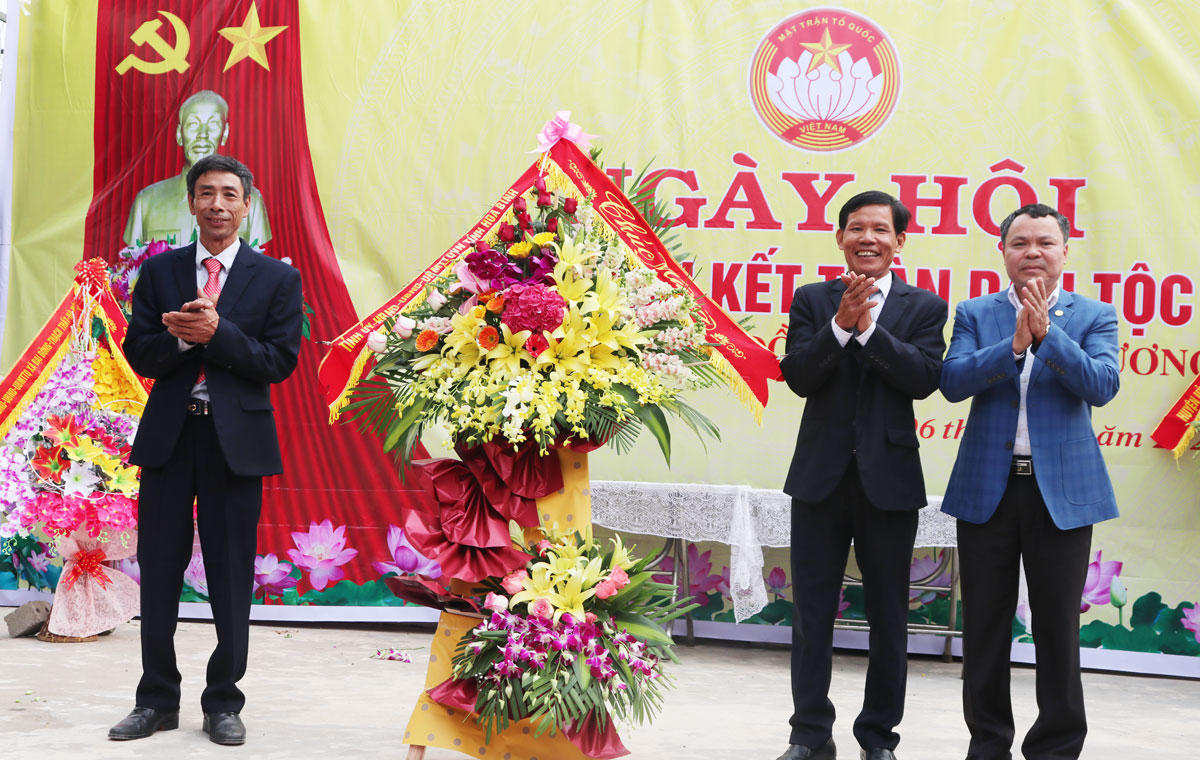
(HBO) - Dai Dong residential area in Yen Thuy district’s Ngoc Luong commune was the first in the district to hold a great national solidarity festival. The festival on November 6 saw the attendance of Nguyen Tien Sinh, head of the Hoa Binh Party Committee’s inspection commission and deputy head of the provincial delegation of National Assembly deputies. Other participants included leaders of the provincial Vietnam Fatherland Front committee, the provincial Military Command, the provincial Health Department, and local officials.
 Nguyen Tien Sinh, head
of the Hoa Binh Party Committee’s inspection commission, presents flowers to people
in Dai Dong on the occasion.
Nguyen Tien Sinh, head
of the Hoa Binh Party Committee’s inspection commission, presents flowers to people
in Dai Dong on the occasion.
The residential area has 192 households with 90 percent of
them living on agricultural production. Local people actively engage in
campaigns on building new-style rural areas and cultural villages. In 2020, the
local per capita income is estimated at over 60 million VND (2,591 USD), with
the rate of poverty households standing at 2.6 percent. All roads in the area
were concreted and 93.2 percent of local households were recognised as cultural
families. Dai Dong has so far met the criteria set for model new style rural
residential areas.
In 2021, Dai Dong aims to raise its per capita income to
more than 65 million VND and cut its poverty rate to below 2.6 percent.
At the festival, organisations, families, and individuals
with outstanding achievement in building the local community were honoured.
Locals were also encouraged to sign commitments to participating in emulation
campaigns next year.
On the occasion, leaders of the province and district
presented gifts to the residents./.
With an increasingly vibrant and widespread emulation movement aimed at building cultured residential areas and cultured families, Yen Thuy District has been making steady progress toward improving both the material and spiritual well-being of its people, while fostering a civilized, prosperous, beautiful, and progressive community.
Once lacking recreational spaces and community facilities, Residential Group 2 in Quynh Lam Ward (Hoa Binh City) has recently received attention for the construction of a new, spacious, and fully equipped cultural house. The project followed the model of state support combined with public contributions in both labor and funding.
The "All people unite to build cultural life" movement, which has been effectively integrated with Kim Boi district’s socio-economic development goals, is fostering a lively spirit of emulation across local residential areas, hamlets, villages, public agencies, and enterprises. In addition, through the initiative, traditional cultural values are being preserved and promoted, while community solidarity and mutual support in poverty reduction and economic development are being strengthened.
A working delegation of the Hoa Binh provincial People’s Committee led by its Permanent Vice Chairman Nguyen Van Toan on June 11 inspected the progress of a project to build the Mo Muong Cultural Heritage Conservation Space linked to tourism services in Hop Phong commune, Cao Phong district.
Born and growing in the heroic land of Muong Dong, Dinh Thi Kieu Dung, a resident in Bo town of Kim Boi district, in her childhood was nurtured by the sweet lullabies of her grandmother and mother. These melodies deeply imprinted on her soul, becoming an inseparable part of her love for her ethnic group's culture. For over 20 years, this love for her hometown has driven Dung to research, collect, and pass down the cultural values of the Muong people to future generations.
In the final days of May, the Ethnic Art Troupe of Hoa Binh Province organized performances to serve the people in remote, mountainous, and particularly disadvantaged areas within the province. These were not just ordinary artistic shows, but they were the meaningful journeys aimed at spreading cultural values, enhancing the spiritual life of the people and contributing to the preservation of ethnic minority cultural identities.



 Nguyen Tien Sinh, head
of the Hoa Binh Party Committee’s inspection commission, presents flowers to people
in Dai Dong on the occasion.
Nguyen Tien Sinh, head
of the Hoa Binh Party Committee’s inspection commission, presents flowers to people
in Dai Dong on the occasion.